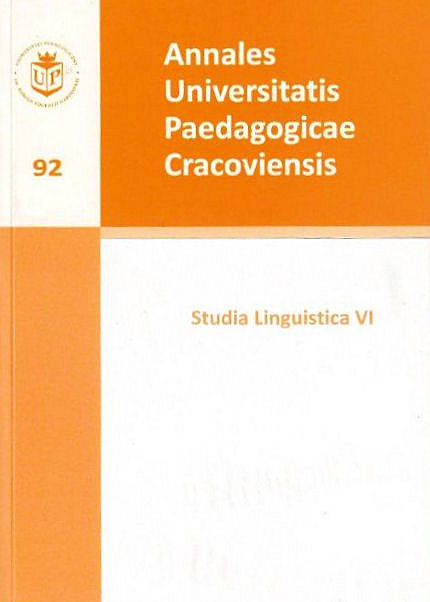Wartości moralne i etyczne w języku prawnym
Main Article Content
Abstrakt
In her article, the author reflects on the ethics and morality of law. She puts forward a thesis that ethical values are not purely empty declarations in the preambles to normative acts and that the legal language itself entails the axiology that is inscribed in the legal system. The article discusses the relationship between the norms of positive law and the good, which, according to the generally accepted natural law, is to be the ultimate goal of all human actions. Reviewing old and contemporary methods of formulating legal texts, the author comes to the conclusion that the universal idea of jurisprudence, according to which the authorities should be bound by law is present in the Polish legal culture. The law is passed for the good of the state understood as a whole, and through legal rules, the goods of all people living in that state are subdued to it. The author states that in the word prawo [law] itself resides the essence of truth and rightness understood as the moral rules of behaviour, opposed to the negative connotations of the word wina [guilt]. Moreover, legal regulations establish the means to guarantee the good and prevent its repression or violation. The traditional rules of language help to forge moral and ethical values which give the power to determine the duties and liabilities associated with particular human actions. The author concludes that ultimately it is the legislator who is responsible for the choice of moral and ethical values which embody the idea of law and, in turn, determine the norms of conduct in social life. The system of legal language, on the other hand, already contains the value-based rules formulated as binding norms. The articulation of the complementariness of rights and duties of legal entities means the affirmation of their rightness and conduciveness to good, but this good is relative. For it is not justice in the absolute sense which is enshrined in legal acts but the rightness in interpersonal relationships, since the latter constitutes the basis of the socially expected legal order.
Downloads
Article Details
Autor, zgłaszając tekst do redakcji czasopisma „Annales Universitatis Paedagogicae Cracoviensis. Studia Linguistica”, zaświadcza, iż jest on rezultatem wyłącznie jego własnej twórczości, że treść artykułu nie była dotychczas publikowana oraz że utwór nie narusza w żadnym stopniu praw autorskich ani praw pokrewnych innych osób, jak również innych praw osób trzecich, a także, że niczyje prawa do utworu (lub jego jakiejkolwiek części) nie zostały pominięte. Po podpisaniu umowy prawa majątkowe do opublikowanych materiałów zostają przeniesione na Uniwersytet Komisji Edukacji Narodowej w Krakowie.
Rocznik „Annales Universitatis Paedagogicae Cracoviensis. Studia Linguistica” to czasopismo o otwartym dostępie, a cała jego zawartość jest udostępniana bezpłatnie dla użytkowników i instytucji na zasadach licencji Creative Commons CC-BY-NC-ND 4.0 (uznanie autorstwa, użycie niekomercyjne, bez utworów zależnych). Na podstawie tej licencji autorzy zgadzają się, że ich prace mogą być zgodnie z prawem ponownie wykorzystywane do jakichkolwiek celów, za wyjątkiem celów komercyjnych, bez konieczności uzyskania uprzedniej zgody ze strony autora lub wydawcy. Każdy może prace te czytać, pobierać, kopiować, drukować, rozpowszechniać oraz przetwarzać, pod warunkiem poprawnego oznaczenia autorstwa oraz oryginalnego miejsca publikacji. Publikowanych tekstów nie można wykorzystywać do tworzenia utworów zależnych (np. do tłumaczenia ich i publikowania w innym języku bez zgody wydawcy). Jest to zgodne z definicją otwartego dostępu BOAI (Budapest Open Access Initiative) „Studia Linguistica”nie pobiera opłat za składanie artykułów ani ich przetwarzanie.
Autor, przesyłając artykuł do redakcji „Studia Linguistica”, bezwględnie zgadza się z poniższymi punktami:
-
Oświadczam, że jestem Autorem lub Współautorem nadesłanego tekstu. Przesłany tekst nie był nigdzie publikowany, jest całkowicie oryginalny i nie narusza w żadnym stopniu praw autorskich ani praw pokrewnych innych osób, jak również innych praw osób trzecich, a także, że niczyje prawa do utworu nie zostały pominięte.
-
Oświadczam, że nadesłany tekst nie został złożony do recenzji lub/i publikacji w innym czasopiśmie.
-
Przyjmuję do wiadomości, że Autor ponosi pełną odpowiedzialność za każdy przypadek plagiatu, niezależnie od tego, czy został on wykryty podczas procesu recenzji, czy po publikacji w „Studia Linguistica”.
-
Oświadczam, że ponoszę pełną odpowiedzialność finansową i prawną za wszelkie roszczenia związane z utworem.
-
Potwierdzam uznanie wszystkich źródeł danych wykorzystanych i cytowanych w badaniach.
-
Potwierdzam, że artykuł został wykonany z należytą starannością zgodnie ze standardami edytorskimi „Studia Linguistica”.
